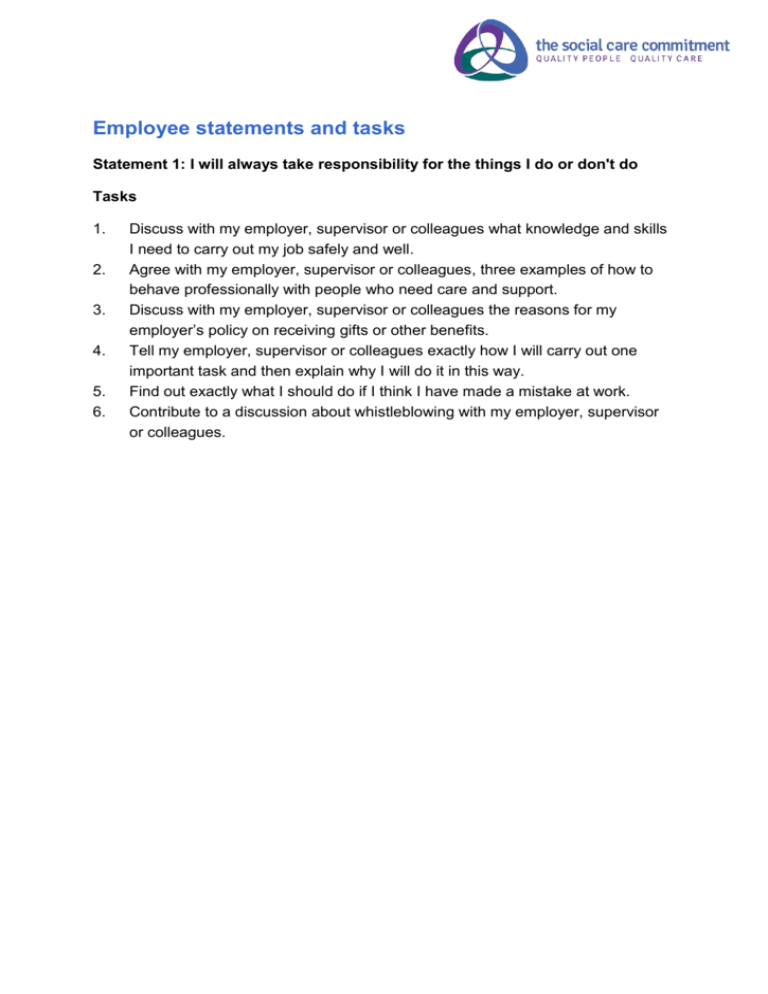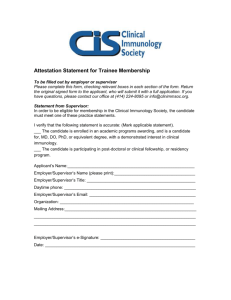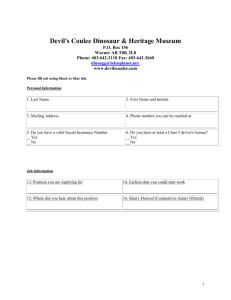Employee statements and tasks
advertisement

Employee statements and tasks Statement 1: I will always take responsibility for the things I do or don't do Tasks 1. 2. 3. 4. 5. 6. Discuss with my employer, supervisor or colleagues what knowledge and skills I need to carry out my job safely and well. Agree with my employer, supervisor or colleagues, three examples of how to behave professionally with people who need care and support. Discuss with my employer, supervisor or colleagues the reasons for my employer’s policy on receiving gifts or other benefits. Tell my employer, supervisor or colleagues exactly how I will carry out one important task and then explain why I will do it in this way. Find out exactly what I should do if I think I have made a mistake at work. Contribute to a discussion about whistleblowing with my employer, supervisor or colleagues. Statement 2: I will always promote and uphold the privacy, dignity, rights, health and wellbeing of people who need care and support. Tasks: 1. 2. 3. 4. 5. 6. Identify with my employer, supervisor or colleagues three examples of what it means to act in the best interests of people who need care and support. Describe to my employer, supervisor or colleagues examples of when I showed respect and compassion to someone even though it was difficult, explaining what made it difficult and what I have learned from this. Agree with my employer, supervisor or colleagues three examples of how privacy and dignity can mean different things to different people and identify ways to check that I am maintaining the privacy and dignity of people who need care and support. Explain to my employer, supervisor or colleagues why it is important to support the people who need care and support to make decisions for themselves, and give three examples of how I enable people who need care and support to make decisions for themselves. Discuss with my employer, supervisor or colleagues three examples of responding properly to comments and complaints. Contribute to a discussion with my employer, supervisor or colleagues about how to challenge each other’s behaviour and attitudes. Statement 3: I will work co-operatively with others to ensure the delivery of safe, high-quality care and support. Tasks: 1. 2. 3. 4. 5. With my employer, supervisor or colleagues make a list or diagram of all the people that I need to work co-operatively with, both inside and outside my workplace. With my employer, supervisor or colleagues identify three ways in which my work supports the work of others contributing to the wellbeing of people who need care and support. Describe to my employer, supervisor or colleagues a time when I shared information with someone who needs care and support (and/or their carers or family) and explain why this was appropriate. With my employer, supervisor or colleagues, agree three examples that show why it is important for social care workers to be reliable, and give others good warning if they cannot do something expected of them. Contribute to a discussion with my employer, supervisor or colleagues to identify things we can do to encourage and support each other at work. Statement 4: I will communicate in an effective way to promote the wellbeing of people who need care and support. Tasks: 1. 2. 3. 4. 5. 6. Discuss three examples of respectful communication with my employer, supervisor or colleagues. With my employer, supervisor or colleagues agree why it is essential for me to communicate effectively. Contribute to a discussion with my employer, supervisor or colleagues about the barriers to including people in decision-making and identify three practical ways to meet the challenges involved. Contribute to a discussion with my employer, supervisor or colleagues around valid consent. Agree with my employer, supervisor or colleagues the kind of concerns that I should report at once and who I should report them to and how. Ask my employer, supervisor or colleagues to show me at least three different examples of clear and accurate care records and explain to me in what ways the records are useful. Statement 5: I will respect people’s right to confidentiality, protecting and upholding their privacy and dignity. Tasks: 1. 2. 3. 4. 5. 6. Ask my employer or supervisor to explain the agreed ways of working on confidentiality and ensure that I fully understand it. Discuss with my employer, supervisor or colleagues when it would be important for me to share confidential information and how I would do so. Discuss with my employer, supervisor or colleagues some examples of how confidentiality might accidentally be broken. Find out what the law says about sharing confidential information and explain what I have found out to my employer or supervisor. Contribute to a discussion with my employer, supervisor or colleagues about why confidentiality is important in care work. Explain to my employer, supervisor or colleagues how important confidentiality would be to me if I was using care and support. Statement 6: I will improve the quality of the care and support I provide by constantly reflecting on and updating my own knowledge, skills and experience. Tasks: 1. 2. 3. 4. 5. 6. Ask my employer to explain how I can get feedback on my work and who I should discuss that feedback with. With my employer, supervisor or colleagues identify three things I could do to improve the way I provide care and support. Arrange with my employer or supervisor a time to observe someone who does the job well and then share what I have learned with my employer, supervisor or colleagues. Ask my employer or supervisor about the learning and development that is essential for my job and agree with my employer or supervisor how and when I will complete this. Ask my employer or supervisor about qualifications and other learning opportunities that could help me develop my knowledge and skills. Contribute to a discussion with my employer, supervisor or colleagues about how to use something that I have learned in training to make a positive difference to people who need care and support. Statement 7: I will promote equality, diversity and inclusion by treating all people fairly and without bias. Tasks: 1. 2. 3. 4. 5. 6. Find out what the law says about equality and diversity, and how to support people to protect their rights, and share this information with my employer, supervisor and colleagues. Find out about different types of discrimination and the range of negative impacts that these can have on different groups of people in society. Contribute to a discussion with my employer, supervisor or colleagues about the challenges to including people who need care and support in activities and identify three practical ways to get over these difficulties. Contribute to a discussion with my employer, supervisor or colleagues about what it means in practice to treat people who need care and support fairly while still respecting their individual differences. Contribute to a discussion with my employer, supervisor or colleagues about treating people fairly and what to do if we think someone is being treated unfairly. With my employer, supervisor or colleagues identify some examples of how people might unwittingly treat people unfairly, be disrespectful of people's diversity or individuality, or not include someone.







